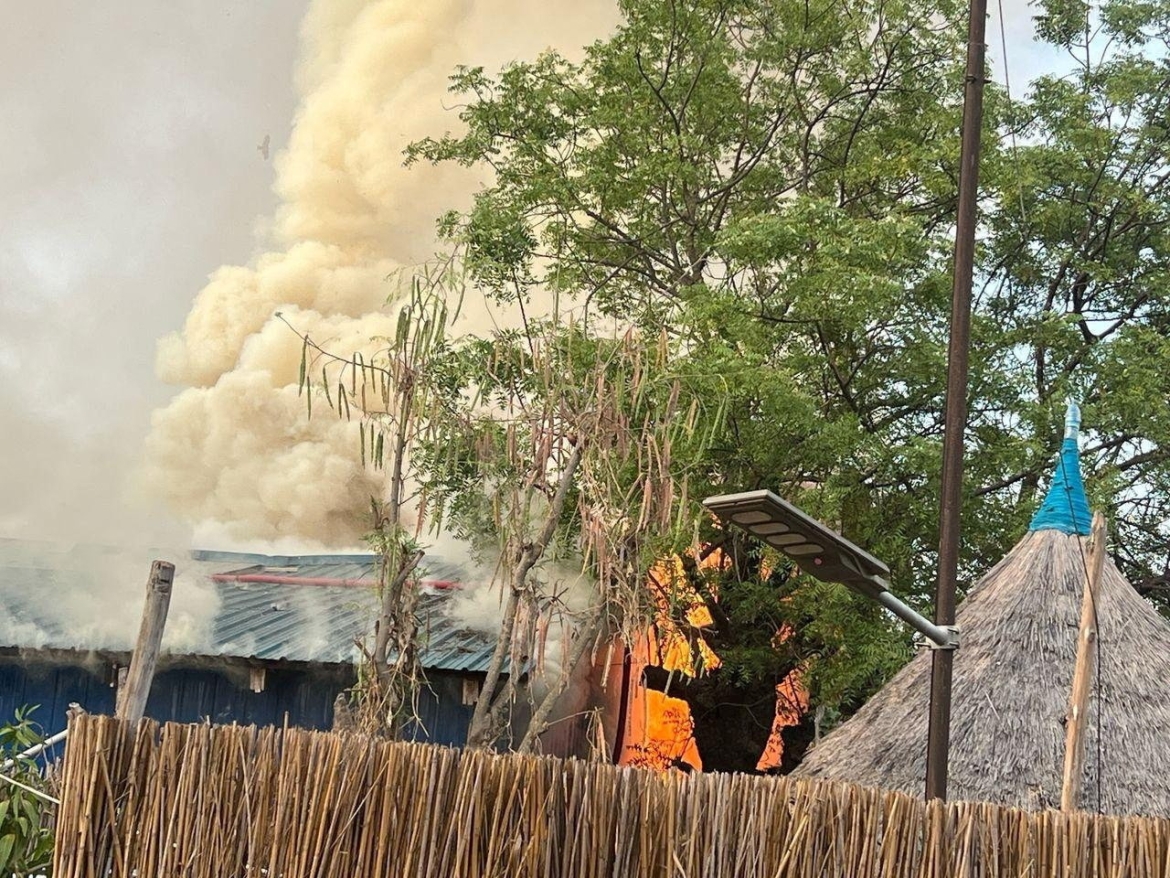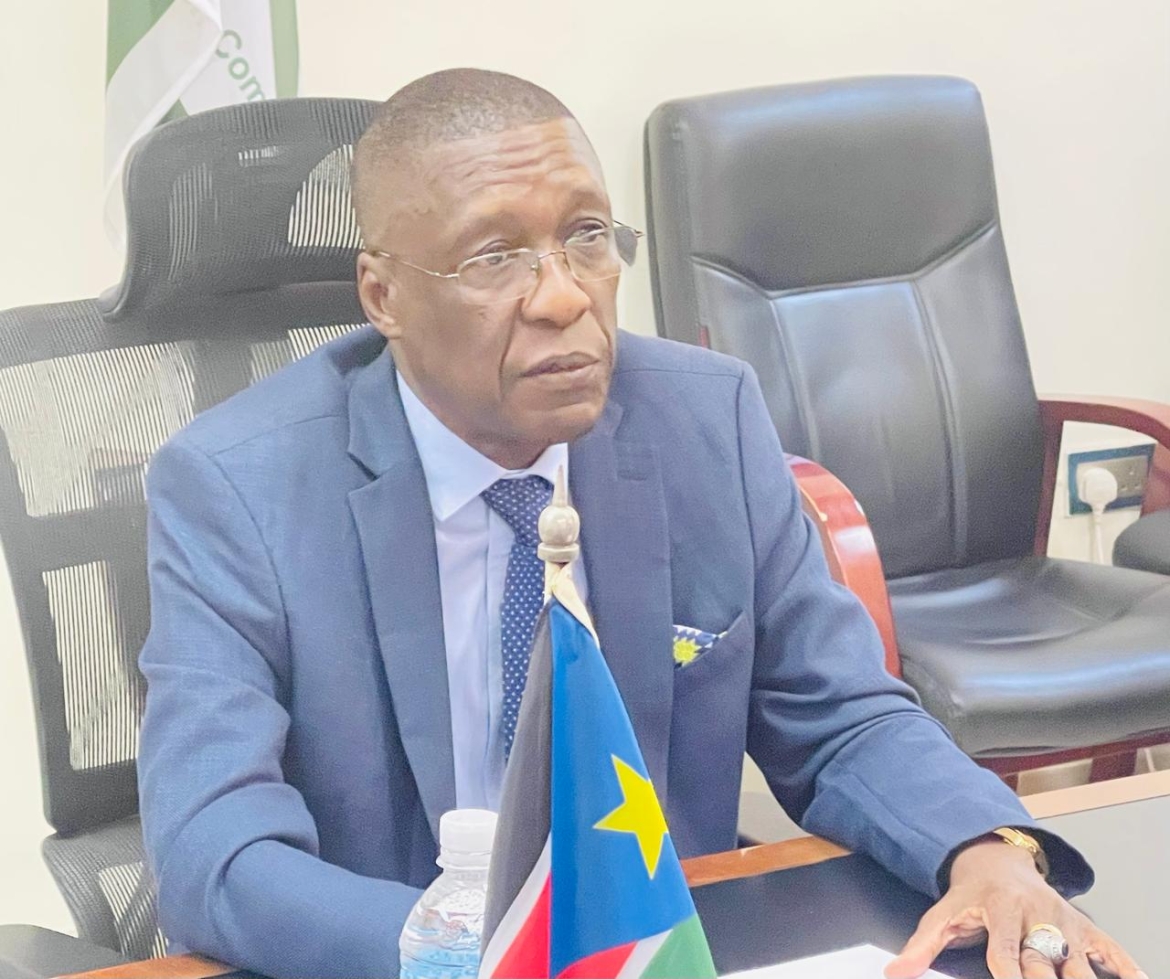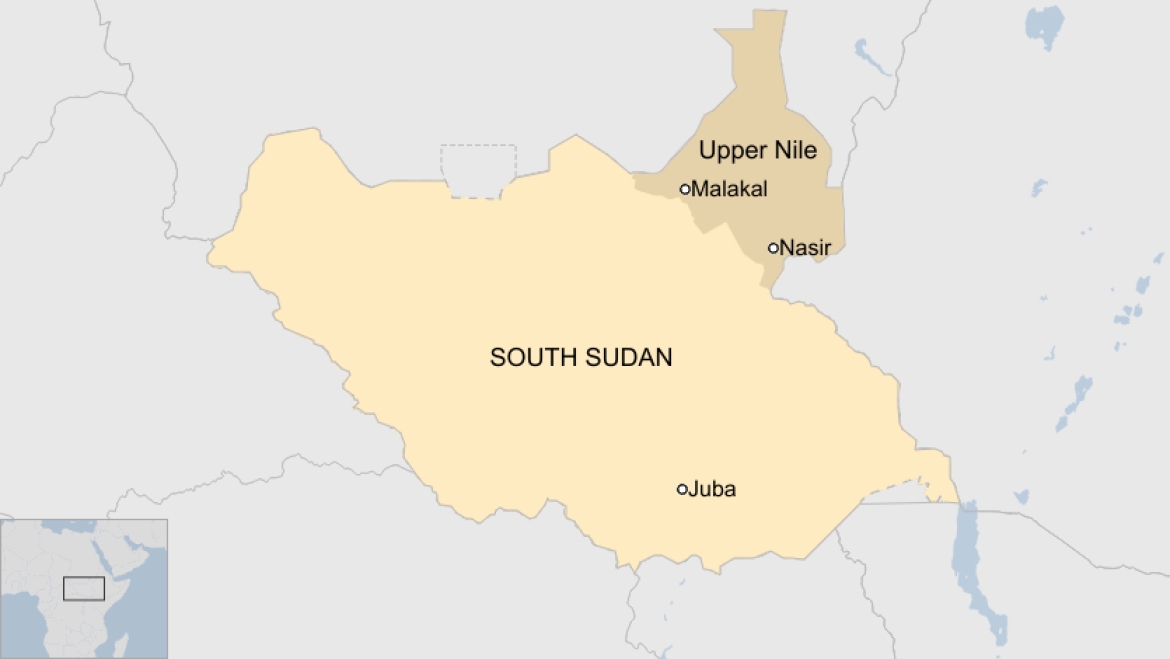CLOSING REMARKS, JMEC DEPUTY CHAIRPERSON AMB. GEN. AUGOSTINO NJOROGE, DELIVERED AT THE CIVIL SOCIETY AT THE CIVIL SOCIETY ORIENTATION & ADVOCACY TRAINING TRAINING WORKSHOP ON THE ARCSS, PANORAMA HOTEL, JUBA, SOUTH SUDAN, DECEMBER 8th 2017
The Representative of the UNDP,
Representatives of the South Sudan Civil Society
Dear Participants,
Ladies and Gentlemen;
Good afternoon!
Let me start by congratulating all of you participants for attending this three-day Civil Society advocacy training workshop on the Agreement on the Resolution of the Conflict in the Republic of South Sudan (ARCSS). I have been briefed on the presentations and fruitful deliberations that you have had, since Wednesday when I opened the workshop.
You have covered a great deal on how best you can speak with one voice and advocate for your rights as the civil society of this country and also had discussions on the Evaluation Report recently produced by JMEC. In addition, I am also informed that the discussions you have had, on the implementation of the Agreement have enabled you to find out ways and opportunities in which you can best engage in a more inclusive and participatory way in the implementation of the Peace Agreement going forward.
I am now confident that you appreciate the modest progress that has been made, the huge challenges that we continue to face together, and reflected on what you as the civil society can do better to support the TGoNU, JMEC and all the other institutions and mechanisms of the Agreement, to deliver on their mandate.
As the Civil Society, you should always be the bridge in your society. You are that public space between the state, the market and the ordinary households in which people can constructively debate and tackle issues.
A vibrant and constructive civil society voice is therefore critical for the realisation of peace, promotion of good governance, democratisation and the rule of law in any country.
The ARCSS if implemented is a foundational stone upon which sustainable peace can be built in this country. For this to happen, the civil society must collectively and continuously;
advocate for the rights of the ordinary citizens, be a watch dog against violation of human rights, educate the population on their rights and responsibilities, hold the leaders accountable, agitate for peaceful resolution of conflicts and dialogue, mobilise the communities and various constituents to participate in governance and development processes, and
Above all, you should be the social capital and a force for good. The civil society must rally on a common goal, set better standards, and rise above all social, political and economic vices like tribalism, partisanship and corruption-to mention but a few.
Finally, let us all use the knowledge we have acquired during this workshop to build a strong, independent, vibrant civil society voice to persuade the parties to the Agreement to honour their commitments and fully implement the Peace Agreement.
With these few remarks, it is my pleasure to declare this civil society orientation and advocacy workshop closed.
Thank you very much and God Bless
JMEC Deputy Chairperson during CSO ARCSS advocacy workshop Wed 05 Dec 2017
OPENING REMARKS BY AMB. LT.GEN. AUGOSTINO NJOROGE JMEC DEPUTY CHAIRPERSON DURING THE CIVIL SOCIETY AND ADVOCACY WORKSHOP ON THE ARCSS DECEMBER 6th 2017
The UNDP Representative,
Dear Participants,
Ladies and Gentlemen;
Good morning!
Let me start by thanking the UNDP and the South Sudan Civil Society Alliance for partnering with JMEC in convening this very important orientation and advocacy training workshop, for Representatives of different stakeholders within the Civil Society in South Sudan.
JMEC is keen on encouraging a vibrant civil society voice and the involvement in the implementation of the ARCSS, as well as in shaping the future for this country going forward.
Despite the many challenges in the implementation of the Agreement on the Resolution of the Conflict in South Sudan (ARCSS), we in JMEC acknowledge the need to continue to promote inclusivity and popular ownership. I am informed that most of you present here today, are already actively contributing to the search for peace in this country in many ways. That is the spirit of a vibrant civil society with which you must all continue-even against enduring challenges.
In addition to the discussions on the Evaluation Report recently produced by JMEC, I am also informed that this three-days will give You an opportunity to find out ways in which you can engage in a more inclusive and participatory way in the implementation of the Peace Agreement. Notably, under the JMEC six thematic working Committees, where you can make substantial contributions through your representative to JMEC.
It is my hope that this workshop will contribute in empowering you to effectively participate, advocate and strategically engage all the parties and other stakeholders to ensure its full implementation, and ultimately the realisation of enduring peace, stability and democracy in the Republic of South Sudan.
With these few remarks, I declare this Civil Society Orientation and advocacy training workshop open.
Thank you very much.
Vibrant Civil Society voice needed in the implementation of the ARCSS, says JMEC Deputy Chair
The Joint Monitoring and Evaluation Commission (JMEC) “is keen to encourage a vibrant civil society voice and active involvement in the implementation of the Agreement of the Resolution of the Conflict of South Sudan (ARCSS)” JMEC Deputy Chairperson, Ambassador. Lt. Gen. Augostino Njoroge said.
JMEC: Vibrant Civil Society voice needed in the implementation of the ARCSS
PRESS RELEASE
(For Immediate Publication)
Wednesday December 06, 2017, Juba, South Suda
JMEC: Vibrant Civil Society voice needed in the implementation of the ARCSS
The Joint Monitoring and Evaluation Commission (JMEC) “is keen to encourage a vibrant civil society voice and active involvement in the implementation of the Agreement of the Resolution of the Conflict of South Sudan (ARCSS)” JMEC Deputy Chairperson, Ambassador. Lt. Gen. Augostino Njoroge said.
He was speaking during the opening of a Civil Society Advocacy Workshop on the ARCSS in Juba, on Wednesday. The participants were drawn from representatives of different Civil Society Organisations in Juba.
The three-day workshop focuses on how to collect data for research and use it for advocacy initiatives, and the status of the implementation of the ARCSS. The workshop is about equipping the participants with the knowledge and skills on how to strategize better engagement within the revitalised ARCSS processes in 2018.
Noting the many challenges in the implementation of the ARCSS, Ambassador Njoroge acknowledged the need to continue to promote inclusive participation and its popular ownership among all South Sudanese.
He added that members of the civil society are already actively engaged in the search for sustainable peace in the country and emphasized “That is the spirit of a vibrant civil society with which you must all continue, even against enduring challenges.”
During the workshop, JMEC’s recently released Evaluation Report will be discussed and alongside ways to engage in a more inclusive and participatory manner in the implementation of the Peace Agreement.
“It is my hope that this (the workshop) will contribute in empowering you to participate effectively, advocate and strategically engage all the parties and other stakeholders to ensure its full implementation, and ultimately the realisation of enduring peace, stability and democracy in the Republic of South Sudan.”
ENDS
JMEC briefs UN team on ARCSS, challenges
The Joint Monitoring and Evaluation Commission (JMEC) has on Friday met the Strategic Review Team from the United Nations headquarters, in New York.
JMEC Deputy Chairperson during peace conference at Yambio on Tue, Nov 28, 2017
NCAC receives submissions from youth representatives in South Sudan
The National Constitutional Amendment Committee (NCAC) has on Wednesday received submissions from youth representatives towards the amendment of the constitution of South Sudan.
JMCC holds its 45th meeting in Juba
The Joint Military Ceasefire Commission (JMCC) has on Wednesday held it 45th meeting in Juba.
Promote peace, tolerance and reconciliation, JMEC Deputy Chair urges faith leaders
The Joint Monitoring and Evaluation Commission (JMEC) has called on religious leaders in South Sudan to be at the forefront in promoting peace and reconciliation in the country.
JMEC DEPUTY CHAIRMAN: “the path to peace firmly grounded on values of Peace, Justice and Reconciliation”
PRESS RELEASE
(For Immediate Publication)
November 28, 2017, Juba, South Sudan
JMEC DEPUTY CHAIRMAN: “the path to peace firmly grounded on values of Peace, Justice and Reconciliation”
The Joint Monitoring and Evaluation Commission (JMEC) has emphasized that “We must all do better in correcting the mistakes of the past and ensuring that the path to peace is firmly grounded on values of peace, justice and reconciliation” JMEC Deputy Chairperson, Amb. Lt. Gen. Augostino Njoroge said.
He was speaking on Tuesday during an Inter-Faith Council for Peace Initiative Conference in Yambio, Gbudue State.
The three-day conference themed “Peace Within and Across Borders” convened by the Interfaith Council for Peace Initiative led by the Bishop of the Catholic Diocese of Tombura, Reverend Edwardo Hiibiro Kussala. It was organized for representatives of nine neighboring states namely Yei River, Amadi, Wau, Meridi, Rumbek, Tonji, Gok, Tombura and Gbudue.
In attendance, were the SRSG for South Sudan Mr David Shearer who gave the keynote address, the Archbishop of the Episcopal Churches of South Sudan Peter Munde, State Governors, Ministers and Speakers among other stakeholders.
Applauding the initiative by the faith leaders, Amb. Njoroge said, “We salute you for leading the way in inter-communal dialogue as you build bridges across your state borders towards peace and social harmony and economic development for all South Sudanese communities.”
“There is a lot of faith placed in the Church to lead the way in seeking solutions to inter-ethnic and other conflicts, as well as in the promotion of tolerance and reconciliation” He added.
“We are all painfully aware of how continued fighting has worsened the economic and humanitarian situation. The number of people in need of humanitarian assistance is now higher than when the Peace Agreement was signed in August 2015 - a fact which the Inter-Faith Council for Peace Initiative seeks to address,” the Deputy Chairperson said.
Since the signing of the Peace Agreement, the Deputy Chairperson noted, implementation of its key provisions “has not lived up to the expectations of citizens or the regional and international partners that support the process.”
“In an attempt to address this, the Intergovernmental Authority on Development (IGAD) has engaged in consultations with key Parties and South Sudanese stakeholders in preparation for a High Level Revitalization Forum intended to reach agreement on steps to reinvigorate implementation of the Peace Agreement.”
Calling on all the stakeholders the Deputy Chairperson said, “we must all work together to achieve the ultimate goal of sustainable peace in South Sudan”.
ENDS
STATEMENT BY AMBASSADOR Lt. GENERAL AUGOSTINO S.K. NJOROGE (Rtd) DEPUTY CHAIRPERSON OF JMEC, DURING INTER-STATES GOVERNOR STRATEGIC PEACE INTERVENTION CONFERENCE YAMBIO, NOVEMBER 27 TO 30, 2017
Your Grace, The Right Reverend Barani Eduardo Hiiboro Kussala, Bishop of the Catholic Diocese of Tombura-Yambio,
Honourable Anthony Lino Makana, Speaker of the Transitional National Legislative Assembly,
Honourable Minister Dr. Martin Elia Lomuro, Minister for Cabinet Affairs,
Honourable Tor Deng Mawien, Presidential Advisor
Honorable David Shearer, SRSG-United Nations Mission in South Sudan (UNMISS),
Excellencies, Governors, Distinguished guests, Ladies and Gentlemen.
I am very pleased to be here this morning. I convey to you greetings and best wishes from the Chairperson of Joint Monitoring and Evaluation Commission (JMEC), H.E. Festus Mogae, former president of the Republic of Botswana, who has sent me to represent him.
The theme of your conference “PEACE WITHIN AND ACROSS BORDERS” demonstrates your collective desire for peace for your country. This theme resonates with our mission at JMEC and we join you, the Interfaith Council for Peace Initiative as you seek to promote peace, reconciliation and development in South Sudan.
Indeed, there is a lot of faith placed in the Church to lead the way in seeking solutions to inter-ethnic and other conflicts, as well as in the promotion of tolerance and reconciliation. We salute you for leading the way in inter-communal dialogue as you build bridges across your state borders towards peace and social harmony and economic development for all South Sudanese communities.
We are all painfully aware how continued fighting has worsened the economic and humanitarian situation. The number of people in need of humanitarian assistance is now higher than when the Peace Agreement was signed in August 2015 - a fact which the Inter-Faith Council for Peace Initiative seeks to address.
South Sudan is wonderfully endowed with natural resources, good arable land and hardworking people. I have no doubt that as the prized ‘last born’ of Africa and the World, and if you keep on the path that is proposed by this inter-faith initiative, you will rise from the current challenges and take your favoured place amongst the nations.
As you know, JMEC is the institution charged with overseeing and monitoring the implementation of the Peace Agreement. The Faith Community is represented in JMEC along with other key South Sudanese stakeholders. We acknowledge the important role the inter-faith community plays in the promotion of peaceful resolution of conflicts and we are grateful for your continued engagement with JMEC.
Since the signing of the Peace Agreement, implementation of its provisions has not lived up to the expectations of citizens or the regional and international partners that support the process.
In an attempt to address this, IGAD has engaged in consultations with key Parties and South Sudanese stakeholders in preparation for a High Level Revitalization Forum intended to reach agreement on steps to reinvigorate implementation of the Peace Agreement.
We must all do better in correcting the mistakes of the past and ensuring that the path to peace is firmly grounded on values of peace, justice and reconciliation. We must all work together to achieve the ultimate goal of sustainable peace in South Sudan. All of us - Faith, Political and Traditional Leaders, Women, Youth and civil society representatives - gathered here today are the critical actors that will ensure this outcome.
Finally, let me wish you fruitful deliberations, and once again thank you for your invitation to JMEC to participate in this most timely and important conference. God bless you.





